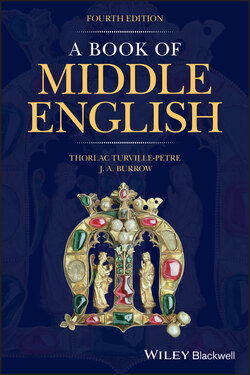Читать книгу A Book of Middle English - J. A. Burrow - Страница 62
5.4.4 Self
ОглавлениеIn Modern English a reflexive pronoun is distinguished by the addition of ‐self: ‘the man hurt himself ’. In Middle English, on the other hand, self serves to reinforce the pronoun, so that Ywan, Uryn son, ette with hymselven, 9/113, means ‘ate with him’, not ‘ate by himself ’, and syre, now þouself jugge, 8/413, is ‘now, sir, you judge’, not ‘judge yourself ’. Particularly in early texts, self is simply added to the personal pronoun, as in þouself above, where it is subject. Later self is treated as a noun and accompanies the genitive pronoun, as in myselfe and my soule, 11/300, and þiself arte clensid, 6/15, though in the third person the masculine form remains himself and the plural hemselven: himself he lerned for to harp, ‘he himself learnt to harp’, 5/29.
Self is used in the same way to reinforce nouns: þe sulve mose, ‘the titmouse itself ’, 2/69, and (with the noun in the genitive) under Krystes selven, ‘under Christ himself ’, 9/51.
